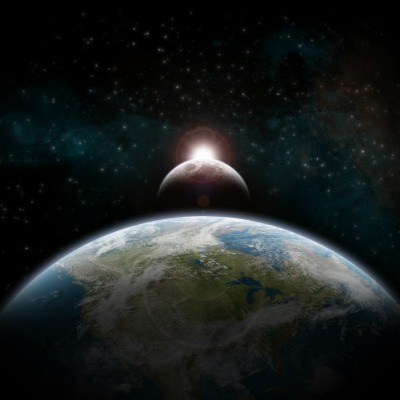"A total eclipse of the sun belongs on everyone's bucket list." -Neil deGrasse Tyson
 Update (8/18/2017)
Update (8/18/2017)
We distributed all of our eclipse glasses this morning. If you weren't able to get a pair, be sure to review the instructions below to make your own viewer.
Update (8/17/2017)
Make Your Own Eclipse Viewer
We have a limited number of glasses we will be giving away starting tomorrow at 9:00 am. Worried you won't get a pair? You can make your own with NASA's easy to follow instructions.
Update (8/14/2017)
Are your eclipse glasses safe? Test them!
The library's Rainbow Symphony glasses come directly from a grant by StarNet and NASA, and are safe to use for viewing the eclipse.
Many stores (including Walmart, Lowe’s, 7-11, Best Buy, and REI) also sell safe glasses. View a list of reputable vendors from the American Astrological Society. Call the stores ahead to check their supply before making a trip.
There is a chance that if you purchased your eclipse glasses online, they might be counterfeit and dangerous to use. How can you tell?
Update (8/8/2017)
There is currently a waiting list for the August 21 solar eclipse viewing at the Tower Rink field. For those who haven't registered but wish to watch NASA's live streaming of the total eclipse with us, the library will display the livestream in the lobby and Pollak Room (1st floor) and in the Youth Services Activity Room (2nd floor). The library's indoor solar eclipse viewing celebration will include eclipse activities for children.
Parking may be limited so consider biking or carpooling with family and friends, if possible. In addition to parking at the library, patrons can also use the Meadow Shopping Plaza lot or the United Methodist Church at Western and Cherry.
Everyone registered for the solar eclipse events at the library will receive certified glasses. If you are using glasses from another vendor, please make sure your glasses meet the requirements for safe solar eclipse viewing. It is unsafe to look directly at the sun. Also, please note that the walk from the library to Tower Rink may pose a challenge for some as the ground is uneven.
The library was awarded a grant by StarNet and NASA for a limited supply of free glasses from Rainbow Symphony. Most of these glasses will be used for our other eclipse-related programs. The remaining supply will be available in the Youth Services Department beginning Friday, August 18, on a first come, first served basis. We'll distribute up to two pairs per patron. Due to the limited supply, we encourage you to check out NASA's list of reputable vendors that make eclipse glasses. You can purchase these special glasses at retail chains such as Walmart, Lowe's, Best Buy and REI.
Original Post (7/7/2017)
Millions of people are expected to gather across the United States next month to observe a total eclipse of the sun--considered to be one of the greatest sky shows on earth.
Come August 21, skywatchers in Northbrook will see a near-total solar eclipse (90 percent coverage of the sun) for approximately two minutes.
Don’t miss our solar viewing party outside the library on Monday, August 21,12:45 to 1:45pm. The celebration will include refreshments, astrology-themed music and games for the whole family! To register, call 847-272-4196 or click here.
During a total eclipse, the sun disappears completely behind the moon, changing from daylight to twilight for a few minutes.
The upcoming total solar eclipse, with its path of totality spanning from Oregon to South Carolina, is a relatively rare phenomenon. The last time the United States fell under a path of a total eclipse coast to coast was in 1918, when the path ran from Washington state to Florida.
The library will have a limited supply of certified solar viewing glasses for attendees to safely watch the roughly two-minute eclipse, courtesy of NASA, the Space Science Institute, StarNet, and the Moore Foundation. Anyone watching the eclipse--whether at the library or in their own backyard--is strongly encouraged to do so with protective eyewear.
The August 21 total eclipse offers a rare opportunity for scientists and space enthusiasts all over the world to analyze the sun’s upper atmosphere called the corona. Although the corona spreads out for millions of miles into space, it is not easily visible from earth. However, during a total eclipse, the blinding glare of the sun is blocked, allowing for the corona’s visibility.
The next total eclipse to traverse the country won’t happen until April 2024, so plan ahead and take advantage of this fun-filled event for an unforgettable experience!




